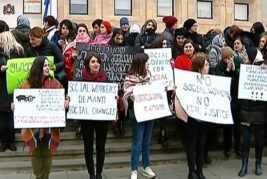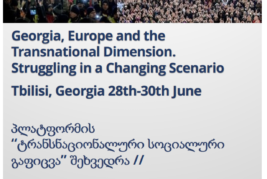
Organized by Commission Economie politique – Nuit Debout (France), Coordination des Intermittents et précaires (France), CNE (Belgium), Precarious Di∫connections (Italy)
Saturday 22nd October, 10-13h, Bourse du Travail de Saint Denis
One of the axes of Transnational Social Strikeplatform concerns the question of the organization of the social struggle in front of a more and more massive precarization of the work. In Europe, while the employers exploit wage differences between countries through a social dumping of transnational scale, aiming at harmonizing at a low level our social models, reforms such as the Loi Travail in France, the Jobs Act in Italy, the Peeters law in Belgique, show a common tendency, supported by the EU, to make the workers always more exploited.
If it is true that there always were sectors particularly affected by social insecurity. Nonetheless, it is not possible anymore today to speak about the « insecurity » as a category opposed to that of the «stable workers» : the precariousness affects as well the workers in the factories as in the schools, in the sector of the auto-entrepreneurship, in the cleaning sector etc. It implies not only a deregulation of contracts, but also an attack against the social rights (an increasing part of salaries is used to buy services which were previously guaranteed) and it includes a set of rules intended to put each worker in the obligation to accept any employment, whatever the remuneration and the working conditions. In this, the so called «uberization» of work points at the common direction in which all labor is going: with no social rights, without unemployment benefits or any employment protection these new kinds of production relations allow capital to avoid to finance welfare state and to develop an intra-national social dumping between workers inside and outside the firm.
In this situation, the unemployment management is one of the pillars of the blackmailing on labor and a tool of precarisation of workers: to dismantle the unemployment compensations, or to limit its access, submits the workers to an almost total availability to capital. So we are democratically «free to choose», but the choices we have is only that between precariousness or unemployment. With no employment protection, counting often on what one earns day by day, the strike seems to the precarious something impossible. What is the unemployed or precarious capacity to participate to economic blockage? How to organize and coordinate strikes when transnational firms put into competitions workers of different production places spaced by thousands of kilometers? One of the challenges at the basis of the social strike is to build the conditions that allow also those who are in a condition of blackmail to express their refusal of labor and exploitation.
In this workshop we would like to discuss and share experimentations of new forms of struggle and claims that have been able to build connection among different faces of precarity, producing new convergences, to think about how to overcome the national divisions and the divisions between sectors that contribute to weaken the collective power of workers, how to build common claims and connections between the inside and the outside of the workplace, that allow to refuse the availability to exploitation that is imposed by the European reforms.




